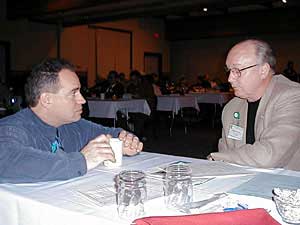March 25, 2005
 |
| Dr. Reed Sulik is a child psychiatrist who runs a mental health treatment program in St. Cloud. He says Minnesota's mental health system is severely understaffed. (MPR file photo) |
Rochester, Minn. — Child psychiatrist Reed Sulik runs a busy a practice in St. Cloud. His colleagues include three other child psychiatrists, and a handful of Ph.D.-level therapists. It's a sizeable operation, especially by non-metro standards. But Sulik says they can't meet the demand.
"Even though those might large numbers, especially compared to other areas, it is still months before a new patient evaluation can be accommodated by our staff," Sulik says.
That's because child mental health specialists like Sulik are few and far between. According to experts in the field that shortage poses a huge problem, depriving kids who desperately need help.
Details are still emerging about Jeff Weise's situation. It does appear that school officials and some mental health providers knew he had problems.
Even so, child psychiatrist Reed Sulik says when something like Red Lake shootings occur, it's clear the system needs work.
"In spite of feeling as if we are doing so much, and trying to be innovative and trying to improve access to care, we're still not doing enough," Sulik says. "Because we're not catching these kids that really need to be caught and helped."
Sulik says the issue of children's mental health needs to be addressed by state lawmakers. Sue Abderholden agrees. She's the executive director of the Minnesota chapter of the National Alliance For the Mentally Ill. Abderholden says the mental health system is underfunded.
Minnesota spends approximately $180 million a year on programs and services related to children's mental health. A $1.5 million federal grant designated for mental health is divided among the state's Indian communities. The Red Lake band receives roughly $211,000 specifically for mental health services.
Even so, Abderholden says that's not enough. She says the system needs to be more comprehensive.
"Children don't live in a vacuum. You can't say, 'We're going to focus on mental health now. Now we're going to focus on academics.' Often, you have to do it at the same time," says Abderholden.
The state is trying, according to Glenace Edwall, who directs the children's mental health division of the Minnesota Department of Human Services. She says the state has spent the past few years trying to bring more services into its public schools. Edwall says early detection is key.
"I think if there's one general strategy we've really been trying to push these last four to five years, it's early identifying," says Edwall. "Because the interventions that can be done early in the course of a disorder are just more effective then waiting until things are very serious."
But with a shortage of mental health providers, especially child psychiatrists, the effort can only go so far. While work continues to recruit more specialists, patient backlogs will inevitably continue to mount.




